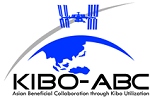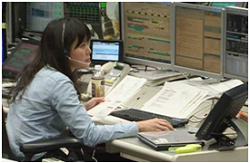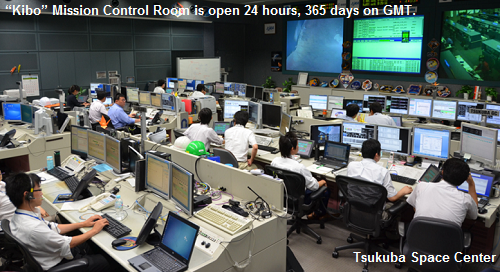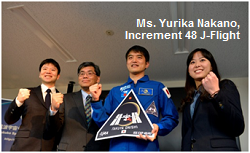This is an archive of information released in the past.
Disclaimer: It may contain broken links or outdated information. Some parts may not function in current web browsers.
*Visit https://humans-in-space.jaxa.jp/en/ for the latest information.

Kibo-ABC members talk with JAXA flight director (J-FLIGHT) about ISS/Kibo operations

Ms. Yurika Nakano, a JAXA flight director, joined the Kibo-ABC regular monthly web-conference to give a presentation about ISS/Kibo operations and answered questions from the members, including new members who had joined recently. All the members had a great chance to learn more deeply about ISS operations through stories based on Ms. Nakano's actual experiences, giving them practical ideas about Kibo utilization and space experiments. In her presentation, she gave an overview of the ISS and Kibo, astronaut activities, explained what a flight director actually does, and how she communicates with other mission control centers of all ISS international partner countries. She also shared her experience in becoming a flight director.
Q&AQ. What was the greatest operational challenge regarding the launch and installation of the Kibo module, and how was it overcome? (Australia)
A. *The JEM flight was postponed for a total of 10 years due to a series of tragic Space Shuttle accidents. But given this additional time, we were able to conduct extensive testing on the ground for the Kibo module, including integration tests with other modules. This was a big opportunity for us to find and fix any flaws as necessary prior to launch. (*JEM/Japanese Experiment Module)

Q. Beyond this period of 100 hours, what other duties must the JAXA astronaut perform as part of ISS operations? (Singapore)
A. Aside from the experiment hours assigned to the astronauts, we also have them perform maintenance tasks for the various onboard systems. The ISS has survived a long time in space, and we must maintain the crew support environment for astronauts to live in. We have many maintenance tasks, such as refurbishing air conditioners and replacing filters.
Q. Regarding our country's proposal of Asian Try zero-G, I've heard that hot air generated from the heater of a dehydration machine could be used to warm up food for the flight crew, and that cold air generated from cold storage could be used to preserve organic matter. Are such things possible? If so, this proposal may be feasible and the crew time could be made shorter. (Vietnam)
A. We already have food-warming devices for the crew's food, and refrigerators are also onboard the ISS. The most difficult part would be how the transfer and supply a sufficient amount of air within the temperature range.
We currently lack such capability onboard the ISS, but we may acquire it in the near future.
Q. Please give us one example of a critical past experience where you had to make a quick decision in order to deal with the situation. (Thailand)
A. The biggest and most frightening moment was the false NH3 (ammonia) leak that occurred in January 2015. While I was at the console, we saw the NH3 leak alarm go off, indicating that toxic NH3 had leaked into our water cooling loops in the ISS. Due to its high heat transfer performance, NH3 is used to transfer heat collected among the onboard equipment. NH3 has a high toxic level and is only used outside of the ISS, but also exchanges heat with water loops that run inside the ISS. Just a tiny drop of NH3 is highly toxic, so any NH3 leak is considered one of the three emergencies: fire, depressurization, and toxic release. After seeing the alarm, all crew members donned their emergency masks and evacuated to the Soyuz spacecraft, where they removed their clothing (due to contamination). Since we lost heat transfer for our equipment, we needed to shut down half of the JEM power, which was a big decision to make. Although the alarm turned out to be false in the end, it is difficult to decide whether such a critical alarm is false at the time.

Q. Will the ISS cease its operation by 2024? If so, what will happen to Kibo? (Malaysia)
A. What we will do with the ISS after 2024 is still being discussed. There is now a special group called the ISECG (International Space Exploration Coordination Group) that shares the goal of achieving manned space missions to Mars from 2035 to 2040. This group includes the 14 space agencies as members. The ultimate goal is to reach Mars, but the two main options of where to go first are still under consideration: asteroids or the Moon. Possible post-ISS missions are now a hot topic of discussion at many space agencies. The many opinions about what to do with the ISS itself range from efficiently using the materials for post-ISS missions to having reentry for the ISS in order to burn up the modules. All possibilities are still under discussion among the various space agencies.
- Some remarks from the new members:
- "I thoroughly enjoyed hearing about her experiences as flight director and was very glad to see a young professional excelling in an important role within the space community."
- "It will help to clarify the feasibility of proposals for Kibo utilization!"
- "The overview of Kibo and the flight director's work were very impressive. Her explanation of the astronaut's schedule let us know about activities in space in detail. She definitely gave us an impressive idea about the importance of a flight controller's work."
Message from Ms. Yurika Nakano:
"I enjoyed our session with the Kibo-ABC members, and would like to thank all the participating members for their great enthusiasm and questions. All questions were very thorough, with great vision and proactive thoughts about JEM usage in the future. We are trying to expand utilization among different countries in many ways. We look forward to working with the Kibo-ABC members throughout the series of Asian Try Zero-G and AHiS experiments this year, and cannot wait to see the results of all the interesting experiments planned and proposed by these members!"
The Kibo-ABC web meeting is held monthly. The session with the flight director in this meeting proved to be a great success for the members, particularly the new members. JAXA is considering new plans for the next opportunity.
| Copyright 2007 Japan Aerospace Exploration Agency | Site Policy |

